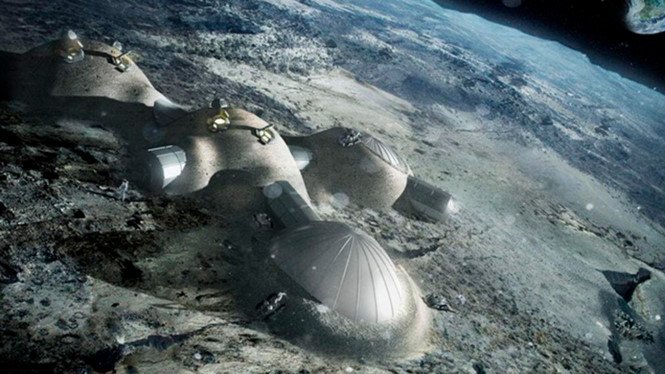Russia will build bases on the Moon to fly to Mars
Before making a manned flight to Mars, Russia intends to cooperate internationally to build a base on the Moon.
Head of the Russian Space Research Agency Roskosmos, Igor Komarov tells RIA Novosti this information on December 28.
"In fact, Mars is an ambitious goal for both Roskosmos and NASA, but I am confident that our immediate plan as well as the European Space Agency (ESA) and NASA are conquering the face. Moon, despite the financial difficulties, we still maintain the Moon research program, we will conduct 5 expeditions with automatic probes, before making a manned flight. to the Moon, " Komarov said.

Sketch 1 base on the Moon - (Source: ESA).
According to him, neither NASA nor ESA can unilaterally implement such a large project: "Both Russia and the US have the technical capabilities, and I think ESA also has, to some extent. But the What a big-scale mission like discovering the Moon and Mars can only be done together. Now shouldn't be the question of who will fly there first. "
Komarov said Russia will ensure the delivery of a manned transport program to the International Space Station (ISS) at least until 2018.
"Most likely, in the future, Russia will ensure that manned general flights go further, such as the Moon, Mars or asteroids. In the short term, we focus our attention on the item. The Moon, which will be a solid technical logistics base for the development of technology fields that allow flight to other celestial bodies.
We must continuously provide the Moon's normal living conditions for at least a year for astronauts and maintain the normal functioning of technical devices. If you can't guarantee it, you won't be able to fly to Mars. I think it will take more than 10 years before we achieve technology strong enough to really have a chance to fly to Mars, ' Komarov said.
According to him, the problem of how to protect the human body from radiation and ensure the long-term effective operation of astronauts on Mars, so far has not been resolved.
"In general, the problem is how to get cells to live to Mars and bring them back to Earth safely. There is still no completely reliable technology for transporting goods and "People are over great distances in the universe. We should absolutely not set goals to achieve rapid victory, but to approach the problem very carefully , " Komarov concluded.
- Russia and Japan want to build bases on the moon
- Russia will build bases on the moon?
- Russia is determined to build a base on the moon
- Aliens have built bases on the Moon?
- Russia will begin to bring people to the Moon by 2030
- Russia will launch ships to collect specimens from the moon Mars
- People will migrate to Mars
- Russia announced the race to build the Moon space station
- The soil on Mars and the Moon can grow trees
- NASA bases on the Moon
- He and America shook Chinese hands and built bases on the moon
- Build base with Moon dust
 Van Allen's belt and evidence that the Apollo 11 mission to the Moon was myth
Van Allen's belt and evidence that the Apollo 11 mission to the Moon was myth The levels of civilization in the universe (Kardashev scale)
The levels of civilization in the universe (Kardashev scale) Today Mars, the sun and the Earth are aligned
Today Mars, the sun and the Earth are aligned The Amazon owner announced a secret plan to build a space base for thousands of people
The Amazon owner announced a secret plan to build a space base for thousands of people